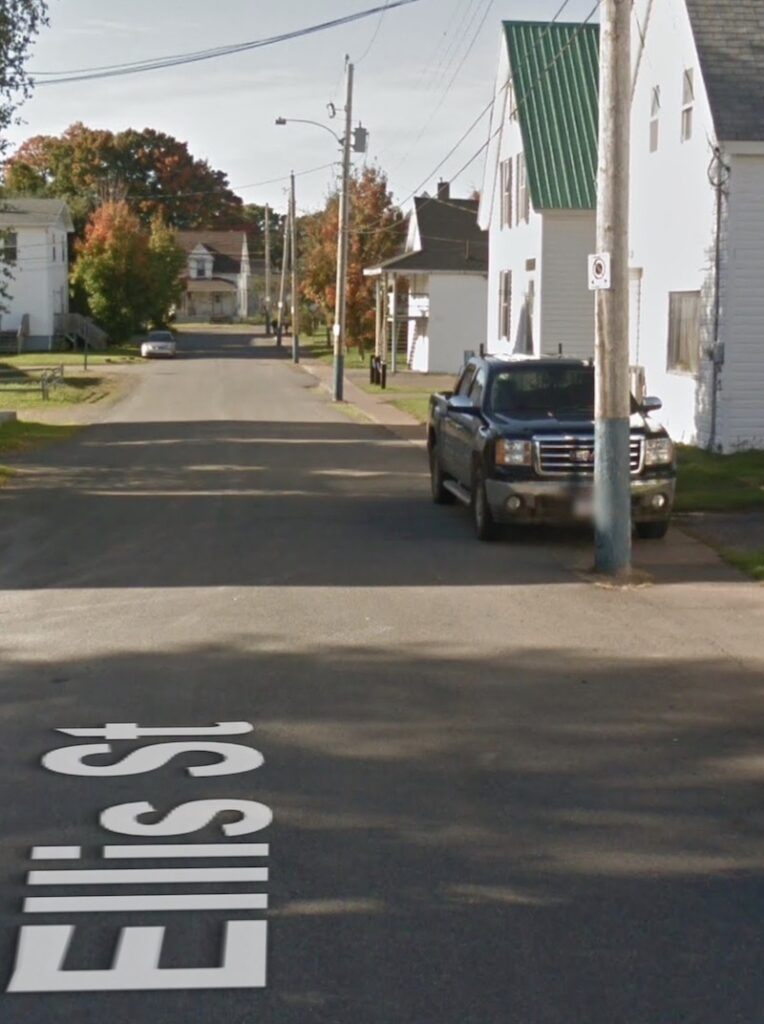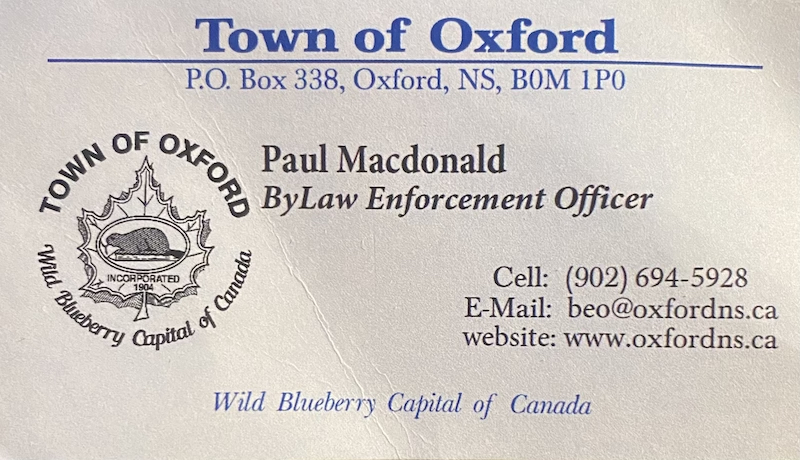Paul MacDonald is Oxford’s new Bylaw Enforcement Officer… and he’s really trying not to ruin your day.
Not yet two months in, Paul MacDonald’s top concerns have been garbage and chickens, with the occasional dangerous and unsightly complaint for good measure. It’s a coincidence that he was hired just as the Town of Oxford was starting to crack down on the proper separation of garbage at the Oxford Depot (aka the Transfer Station).
In a chat with HelloOxford this week, MacDonald said he’s been stationed at the Depot this month when it’s open, but not to help separate your garbage from your recyclables: he’s been tasked with backing up the two town employees who’ve been helping and educating town residents on proper garbage disposal, and have received no small amount of abuse as they do their jobs.
“I had to ban two residents for thirty days,” he says, shortly after the town began enforcing separation regulations, something that isn’t new —though the stricter enforcement might make it seem so. But that’s a decision that’s out of the town’s hands: tighter enforcement dictated by the provincial government. On the first weekend in which employees were available to review residents’ garbage bags at the Depot, verbal abuse got out of hand. While MacDonald says it’s calmed down significantly since then, yet another resident with anger issues created a scene recently and will likely be restricted from the Depot. Hopefully people will calm down and realize it’s just garbage and MacDonald won’t be needed on-site for the long haul… but for the time being, he’s an extra set of eyes, and an authority, in case he’s needed.
The Bylaw Enforcement Officer
Taking up the job of Bylaw Enforcement isn’t for the faint of heart. Reminding people that they live in a society that has certain rules of conduct can bring out the worst in some folks. MacDonald credits his time in the military, and his 25 years working as a Corrections Officer, as giving him the skills to de-escalate conflict and help people to see reason. When asked why he was interested in taking on the Bylaw Enforcement Officer position, he says, “I worked in law enforcement for many, many years, retired young. I was sitting at home, getting a little bored, belly getting bigger. This job came up and I said that might be interesting for me to do. And it’s another way for me to give back to the community some and improve our community.”
It’s also a job that can cause more grief than resolution, if done the wrong way. MacDonald appears to be bending over backward to make sure town residents are treated as fairly as possible, while making sure regulations are followed. He says, “I’d rather work towards an amicable goal than to write anybody a ticket.” One local resident, affected by a bylaw enforcement process, said on social media: “I want to thank the new bylaw officer for being truly the most kind person ever.“
Cock-a-doodle-don’t
A noise complaint about a bothersome rooster led MacDonald to check out a residence in the downtown residential area. He found the rooster, and a bunch of chickens as well. Under the existing regulations, the size of the homeowner’s lot was too small to allow for any livestock. Primarily for matters of hygiene and sanitation, there are rules to follow to keep chickens, pigs, cows, horses, etc. And in this case, none at all were permitted. Any lot under 0.8 hectares (1.98 acres) cannot sustain both people and livestock.
Many communities have bylaws pertaining specifically to chickens, ensuring they have sufficient room to roam around, a secure enclosure, and with distance requirements from a dwelling and the property line. And while the bylaw is there —and available to the public via the Town of Oxford website— MacDonald recognizes that it can be a little challenging for people to understand. He says, “we’re going to have to go over and we’re going to redo some of our bylaws over the winter and fine tune them. The older bylaws are hard to read because of the way they wrote them. So we can revamp our bylaws and make it so everybody can understand them a little bit more.”
MacDonald notes that residents do have options if they disagree with his decision on bylaw enforcement: they can appeal to Town Council. “Everybody that has any type of enforcement taken against them can appeal to the council. They can appeal my decision. What they can’t appeal, though, is the council’s decision. I am following the letter of the bylaw.”
Bylaw enforcement doesn’t automatically mean that someone is getting a ticket, or a fine. MacDonald looks at it as, first and foremost, an opportunity to engage with the public and educate residents. Another recent case involved “…a dog that kept running out at people and trying to bite them. I knocked on that person’s door and hopefully that’s going to be rectified. I don’t think most people are aware that they need a dog license in Oxford. Every dog needs to be licensed, especially a dog that might run free. So you’re doing your dog a favour as well — it’s a great way to find out who the dog belongs to. Just last week, we had two dogs running around in Oxford that the RCMP had to gather up and had in their cruiser” until someone could take them.
Dangerous and Unsightly Premises.

There are a number of properties in town that appear abandoned, and others that are either falling down or (due to their condition) should be demolished. The neighbours see these properties every day, and wonder why “nothing’s been done”. But, MacDonald says, “a lot of the problem we’re running into with these derelict houses is we can’t get in touch with an owner or somebody that’s responsible for that property.”
Ultimately, the town has to balance property owners’ rights with community health and safety. An abandoned house where rats or raccoons can nest in causes problems for everyone nearby. A building with unsecured doors and windows represents a potential danger for curious children. At a certain point, with all avenues for dialogue and action exhausted, the town may do what has to be done, the bill for that work gets added to the property tax bill, and the owner ends up paying in the end, or loses the property to a tax sale.
There’s a process to be followed, but without communication with a property owner, the process has to play out. Even getting to the point where the town takes action —whether it be hiring someone to clean up overgrown yards or a building being demolished— takes time. There are legal aspects to the municipality taking action against private property. But residents should be reassured that work on the file is proceeding. And when in doubt, contact the town.
Parking

This is one issue where Oxford residents —and visitors— may chafe under the regulations. MacDonald is particularly concerned about the parking situation during the annual Cumberland County Exhibition. Finding a parking spot close to the Exhibition grounds —meaning Ellis St., Prince William St., Duke St., and Waverly St. for the most part— is always a challenge. For the Bylaw Enforcement Officer, who lives in the neighbourhood, there are significant problems.
MacDonald is particularly concerned with the ability of the Oxford Volunteer Fire Department to get their vehicles through any of those streets in an emergency. He says a conversation with the Exhibition Committee will take place, but recognizes “there’s not much they can do, but we’re going to have to start putting tickets on vehicles so that they realize safety of the community is the utmost importance. And if somebody has to get a parking ticket to realize that, then that’s what’s going to have to happen.”
Beyond instances where the public ignores “No Parking” signs, MacDonald is particularly concerned with those who park on the sidewalk. Drivers might be thinking that they’re doing so to not block traffic — and end up blocking pedestrians instead. For those who are mobility-challenged, anyone in a wheelchair or who needs a mobility scooter to get around, a blocked sidewalk can be a significant obstacle.
Times are a-changing
MacDonald says a big part of the challenge facing the community with regard to bylaws is that people have been able to ignore the law for too long. “I’ve even heard it at kids ball games, somebody smoking. And you’re not allowed to smoke on the town property like that. Somebody has said, ‘well, there’s nobody to enforce it, I’m going to do what I want to do.’ Well, there’s somebody to enforce it now.”
Most of the time, bylaw enforcement should be easy. And for those who don’t follow the rules, or refuse to work with the Town to address concerns, MacDonald says it can become a serious matter: “I have files open now that are actually looking at a court action all the way down to, hey, I knocked on your door and everything’s fine. So that’s the variance in our type of files that we have.”
“We just need to keep everything friendly. Don’t get mad. Talk it out.”
Reaching out and getting results
MacDonald says the public is an important part of making our community a better place to live: “We have to have the complaint in order to generate a file and start any type of enforcement action.” A paper trail is an essential part of the process when enforcing bylaw complaints. This isn’t a matter of “ratting out” your neighbours. As much as we may think it makes sense that people are allowed to keep a few hens to provide eggs, particularly in a time of rising grocery costs, the health and safety regulations have been developed over may years of consideration. Under the Municipal Government Act (MGA), municipalities like Oxford have a limited scope in which to set their own bylaws. And while the “chicken bylaw” might upset some people, bylaws exist to help residents live together in a common and universal code of conduct. There is always a balance to be struck between freedom and responsibility.



